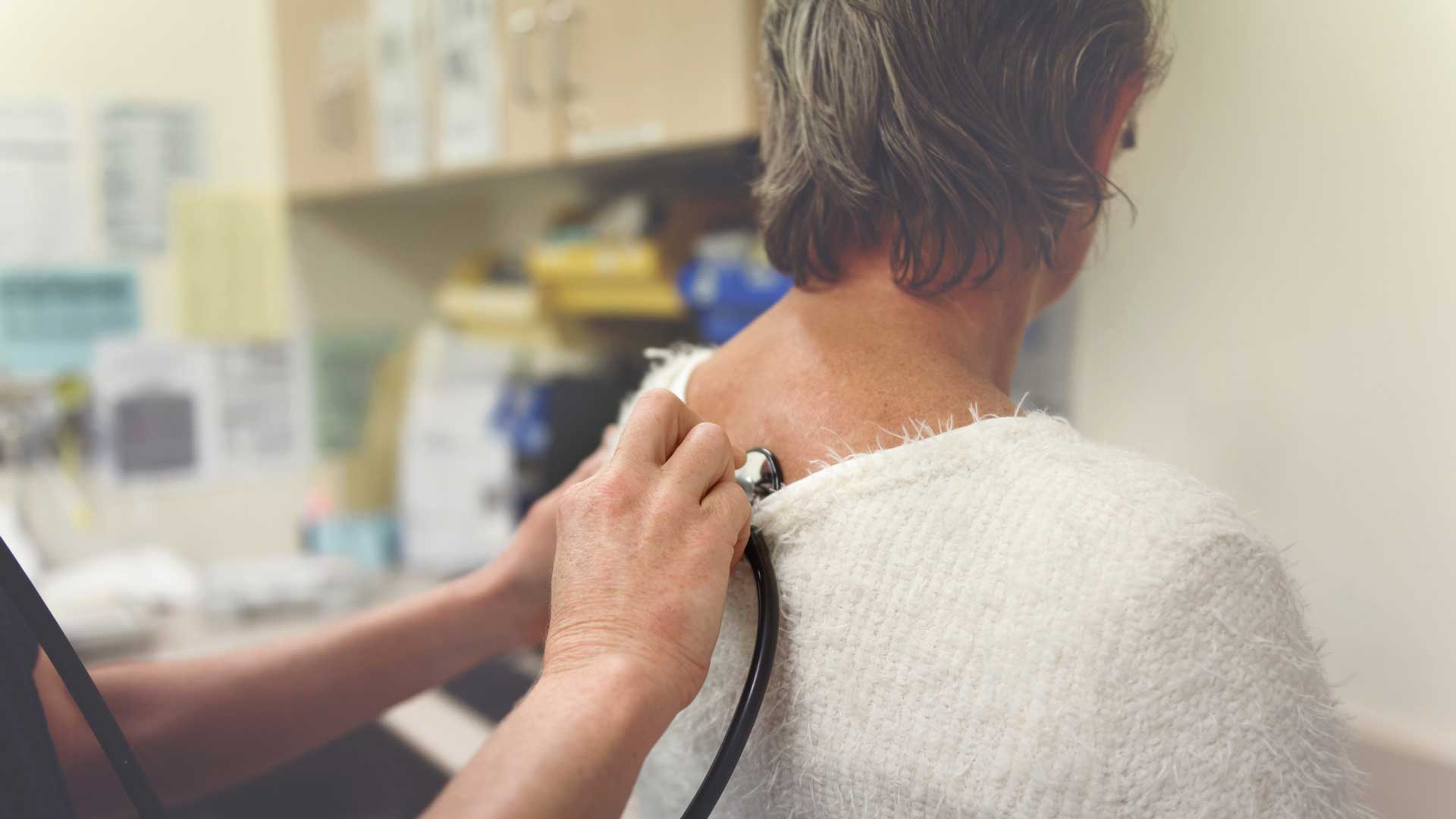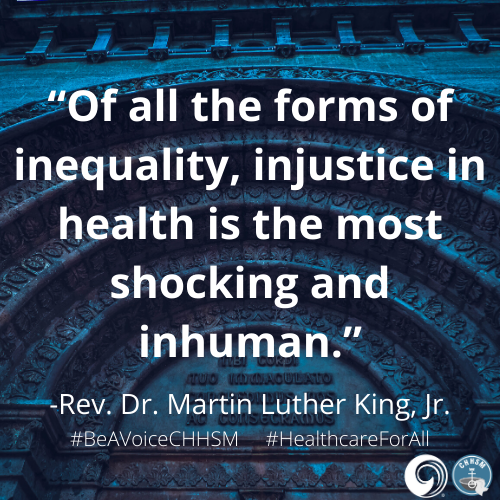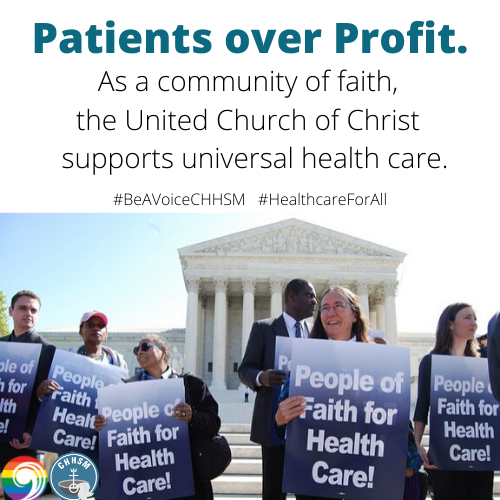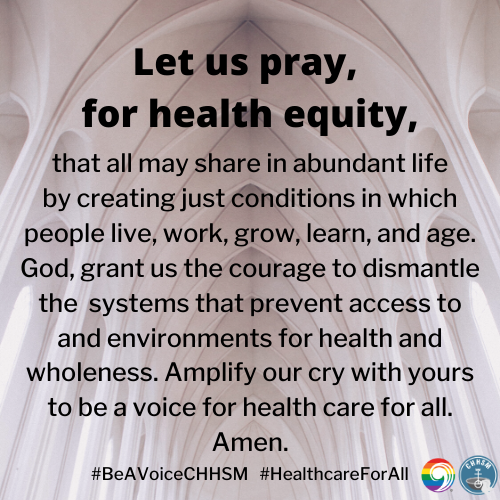CHHSM Advocacy Center
Vol. 1: Healthcare for All

M.R.'s Story
"I do not know what I would do without the Salam Clinic,” says M.R., a patient at one of the free health clinics run in partnership by local congregations, Deaconess Nurse Ministry, and physicians from the Islamic Foundation of St. Louis, MO. “Nurse Virginia and the doctors here are a God-send. I do not have any health insurance, so I am so glad to have a place to come and get the medical care I need for my diabetes and high blood pressure."
Two of these clinics are housed in UCC congregations and offer walk-in services for anyone who comes through their doors. “Most of the clients are uninsured or under insured with plans with high deductibles and limited coverage,” says Rev. Donna Smith- Pupillo, executive director of Deaconess Nurse Ministry. “The clinic provides a place for those who do not have health insurance. Universal health coverage would make it possible for folks like M.R. to get the care they need.” To learn more about CHHSM organization, Deaconess Nurse Ministry, visit faithnurses.org.
Background Information
In 2013 over 44 million people in the U.S. were uninsured; now with the passage of the Affordable Care Act and with the full provisions having gone into effect, 20 million people have gained coverage. With changes to eligibility and significantly expanded access to Medicaid, there is evidence to suggest that the ACA has had an “an equalizing effect, reducing racial and ethnic disparities in coverage.” There are a lot of wins from the ACA; yet there are still continual efforts to erode access to affordable care, such as attempts to repeal the ACA or restricting its reach. By many measures, this would be devastating for folks like M.R. in the story above. Some estimates show that nearly 30 million people would lose their health care coverage, if the bill were repealed. The ripple effect which would be felt in every home and every community, making it harder to address ongoing health crises in the U.S., including the opioid epidemic.
Current Context
Simply preserving and protecting the ACA has been a tremendous uphill battle; and the changes that were implemented are critical for millions around the country. The reliance on the private insurance marketplace means costs are not contained, and without Congressional action, costs will continue to go up. Moreover, in the U.S. the high cost does not guarantee better care. According to the OECD, the health care system in the U.S. is the most expensive in the world but does not have the best health outcomes. The out-of-pocket costs for many folks are just too high, resulting in medical debt and often bankruptcy. In fact, medical bills are the biggest cause of bankruptcy in America. As prices continue to rise, there are no repercussions for drug companies and health care providers. A recent study showed that American’s borrowed over $88 billion last year to pay for medical costs. As long as access to health care is a for profit operation, and people are seen as commodities and dollar signs, we are never going to have a health care system that is affordable.
A Faith-Based Response
For more than thirty-five years the General Synod of the United Church of Christ has advocated for health care as a right and a priority for all people. The Christian scriptures and tradition understand
that addressing the general welfare of the nation includes giving particular attention to people experiencing poverty or sickness. For their sake and for the common good, we must continue to make progress toward a U.S. healthcare system that is inclusive, equitable, affordable, accountable, and accessible for all. General Synod 29 adopted a two-fold policy statement which asked UCC members to support the passage of legislation to provide health care for all and to address the implications of health disparities and inequities through study and discussion. We have endorsed the Medicare for All Act which would provide every person in the United States with full health coverage.
As it stands now, our system is failing millions of people, particularly vulnerable populations. Many people report delaying medical care, or not receiving care because of cost, either because they don’t have insurance, or their premiums, deductibles and co-pays make accessing a provider prohibitive. Medicare for All would mean that individual health spending would drop significantly. Continuing with the commodification of health care, as just another product to be bought and sold, enables for-profit health care providers and drug companies to charge as much as they can to profit. Medicare for All endeavors to equalize access to care and keep those outrageous costs down.
Questions for Candidates
Access to healthcare should not be a privilege and every person, regardless of ability to pay, should be able to access inclusive, affordable, accessible, and accountable health care. How can you help make that happen? Ask candidates in state, local, and federal elections about their health care plans. Ask what they will do for your community to make sure everyone has access to quality, affordable health care.
- How will you protect access to health care now for your constituents, and what plans do you have to preserve and protect access?
- Do you support Medicare for All?
Social Media Samples
- Health care is a right, not a privilege. This is important to me because [why it’s important.] As a [ex. teacher, parent, Christian, etc.] I’m proud to support #HealthcareForAll. #BeAVoiceCHHSM
- Universal health care coverage is essential to creating a more just and healthy society. The ability to access health services is related to multiple social, economic, and environmental factors as well as barriers, like the cost and availability of health care. Let us advocate for #HealthcareForAll and #HealthEquity in 2020. #BeAVoiceCHHSM. Click here for the graphic.
Follow the UCC’s Council for Health and Human Service Ministries (CHHSM) at:
Follow the UCC’s Justice and Witness Ministries (JWM) at:
More Information
For additional information on health care for all and health equity, check out these resources below:
- Getting to Universal Coverage by the Asian & Pacific Islander American Health Forum (APIAHF)
- Health in All Policies: A Guide for State and Local Government by Public Health Institute
- Seeking Justice in Health Care: A Guide for Advocates in Faith Communities by Faithful Reform in Healthcare
- The Health Equity and Accountability Act (HEAA) Fact Sheet
Where to Find Us
Please visit our websites to learn more about CHHSM and JWM.



